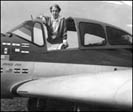| She has acquired a long list of
aviation firsts. In July 1943 she obtained a USA
commercial pilot’s licence with additional ratings
as instructor and for flying on instruments only. For
several years she was instructor of instrument flying in
the Brazilian Air Force and for a commercial airline. She
has 25 decorations, eleven of them being military. A number of South
American nations have made her an honorary pilot of both
the Brazilian Air Force and civil aviation. She has made
numerous international flights and in 1951 flew with
presidential greetings on a good will tour throughout the
Americas. Still actively flying, she is a member of many
of the aviation associations in this country.
Anesia
Pinheiro Machado of Brazil has been called the "Dean
of all Woman Pilots" because of her pioneering
achievements as a woman pilot.
 
The Evening
Star, Washington, D. C., Tuesday, October 3, 1961.
Flying
High: Her Specialty
By Monica Ryan
"Firsts"
are nothing new for the aviatrix whom Brazil has sent as
one of five delegates to the 12th meeting of the
International Astronautical Federation meeting here this
week.
"When I
was just a slip of a girl," recalls Anesia Pinheiro
Machado, in private life the wife of Retired Air Force
Gen. A. Appel Neto, "my only ambition was to learn
to fly something which in those days was simply unheard
of."
She obtained
her first license in 1922. "It was Brevet number 77,
Aero Clubs of Brazil, Federation Aeronautique
Internationale."
Immediately
after obtaining her license, she acquired a long list of
"firsts": First woman pilot in Brazil to carry
passengers; first Brazilian aviatrix to become a
journalist writing exclusively on matters of aviation.
History
of Flight
In September of
1922, on the centenary of Brazilian Independence and
barely five months after obtaining her license, she
completed an interstate flight, the first by a Brazilian
aviatrix, from São Paulo to Rio de Janeiro.
"I wanted
to do something to commemorate the centenary," she
explained. "I thought: Why not fly to Rio? It would
be a beautiful thing and one which I, as a pilot, could
do all alone." She never for one moment expected to
create a sensation.
However, that
is precisely what happened.
"The trip
took four days. I flew an hour a day, perhaps, or an hour
and a half at the most. I made stops all along for
gasoline. Imagine my amazement when I arrived at eight in
the evening at the airport in Rio, and saw all those
people. I could not believe it was for me that they were
waiting," she says.
There were
flowers; there were congratulations from government
personalities. She was so young, so lacking in vanity,
that she could not believe that it was all attributed to
her, or that the flight had had a great significance.
It was then
that the Brazilian aviation pioneer Santos Dumont gave
her the gold medal which she treasures as her good luck
piece. It is a replica of one given to Santos Dumont by
Isabel de Bragança. "It is my amulet. I always have
it with me," she says.
In April of
1943, when she had been flying for 21 years, Anesia
Pinheiro Machado’s dream of coming to this country
was made possible. She was invited by the Government to
take an aviation course at the then CAA Standardization
Center in Houston, Texas. This trip was sponsored by the
coordinator of Inter-American Affairs. She also took a
course at the PAA school at La Guardia Field in New York,
in instrument flying.
U.S.
License
On July of that
year she obtained a commercial United States license,
with flight instructor and instrument ratings.
She has the
greatest admiration for American women fliers.
"During the second World War," she says,
"they took over many of the duties of pilots to free
them for combat duty. It was a magnificent thing."
Small and
slender, extremely likable, she communicates her
sympathies so eloquently that she makes devoted friends
wherever she goes.
She sees in
aviation a means of bringing closer together "all
our countries." "The greatest satisfaction I
believe I ever had was in 1951, when I delivered
greetings to presidents in North, Central and South
America. The then secretary general of the OAS, who is
now President Lleras Camargo of Colombia, gave me the
letters to deliver personally," she says.
After long
service as an instructor in the Brazilian Air Force and
for commercial airlines, she was awarded numerous titles,
and military and civilian decorations from her own and
several other countries. Brazil alone has awarded her six
military and six civilian decorations.
She is an
active member of Brazilian and international aeronautical
societies.
|

